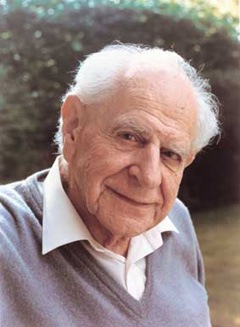Falsifiability and Objective Reality
 Karl Popper believed that a theory is scientific if and only if it is falsifiable. Most scientists would agree with this statement, and in fact would be shocked by anyone who didn’t. (This may be why natural scientists and social scientists don’t tend to hang out together!) But, falsifiability presupposes a belief in an Enlightenment-style “objective” reality beyond that of our own minds. In much of social science, especially in sociology and psychology, there is a powerful belief in a post-modern relativism that rejects an objective reality. That is to say, they don’t believe that there is a truth that is inherent to the objects of study themselves.
Karl Popper believed that a theory is scientific if and only if it is falsifiable. Most scientists would agree with this statement, and in fact would be shocked by anyone who didn’t. (This may be why natural scientists and social scientists don’t tend to hang out together!) But, falsifiability presupposes a belief in an Enlightenment-style “objective” reality beyond that of our own minds. In much of social science, especially in sociology and psychology, there is a powerful belief in a post-modern relativism that rejects an objective reality. That is to say, they don’t believe that there is a truth that is inherent to the objects of study themselves.
Without a belief in an objective truth outside the mind of the observer, it is impossible to even discuss what it would mean to falsify a statement. Therefore, you cannot use Poppers falsifiability axiom as a demarcation line for what is and isn’t science. And now we allow in all sorts of unfalsifiable statements and theories simply because who is to say what is and is not objectively true? This is not good science. But, it defines much of what passes for science in the world of social inquiry.
Now, it must be said, that the truth is likely somewhere in the middle. But, most relativists are basing their relativism on what I’d consider a false understanding of some basic ideas. Among the more common things I hear when encountering someone who is a hardcore relativist, who wants to impress me (knowing that I’m a mathematician) is with the idea of quantum physics. It usually goes something like this, “hey, man, you know that every time we observe a particle we
change it’s state. So, everything is relative. Our presence changes what we observe. There is a reflexivity between us and the object. There is no way to know what’s what if every time observe something that something changes. Reality can be and is manipulated.”
OK, true. But, it’s missing the point. When we say we change a particles state, we aren’t saying the particle didn’t have a state to begin with. It was simply a state we can’t directly observe. That isn’t relativism in the strictest sense. Sure if I observe it and you observe it, we’ll see different things, but that doesn’t mean the particle didn’t have an objective state before we each changed it. True relativism would be that the particle has no state until someone
observes it. But, that isn’t quite how it works.

Think of a particle as a coin. Suppose I spin that coin on a table. While it is spinning is it heads or tails? You might say neither, or more accurately, you could say both. It’s 50% heads and 50% tails. That’s its "objective" state. We'd think of it as a probability of heads vs tails, but that is in fact the definition of quantum state.
In mathy terms, we'd call it a convex linear combination of basis states. So if we wrote Heads as H and Tails as T, and picked the number "p" to be a number between 0 and 1, we could write the state of the coin as pH + (1 - p)T. It's a probability. But, it's still a state defined by the equation above.
This can get worse: what if we lived in a world where we weren't able to see a coin while it was spinning. What if we could only see coins when they are heads or tails with 100% probability – that is, when they are flat on the table. Then if I wanted to observe the coin, I'd have to slam my hand down on top of it to stop it from spinning (assuming I knew where to slam my hand down!). And what if, for example, that it landed heads up.
Now suppose it always pops back up and begins spinning again after a minute. Then you come by and slam your hand down on it. If you caused it to land on tails, then we’d each have seen the same coin in different states. I'd claim the coin is heads, you'd claim the coin is tails, but neither of us would realize that it was a combination of both before we slammed our hands down on it.
Many things in the natural world are of this form (or we're forced to deal with them in a form like this). That doesn’t mean we can’t study them objectively, and infer what we can, correct for our own “observation” errors, etc. Physics is going along just fine with far crazier objects than humans could ever hope to be. There is no reason we have to pretend that studying human behavior is somehow so much harder than studying particle physics.
Popper’s 3 Worlds
There is no doubt that the reality outside our minds is not always in line with the perceived reality we hold within our minds. Many natural scientists, in light of this, are Cartesian dualists without even knowing it. That is, they accept that there are two worlds: the world of material things that we study; and the world of the human mind. They accept that these don’t always jive, and that each one has an influence on the other. But, keeping them separate, at least heuristically, is seen as useful.In social science there is a stronger emphasis on the effects culture on the mind. And this is seen as a feedback loop from the mind to itself. Karl Popper goes one step further with his heuristic and suggests that the universe is really made up of three worlds. The objective world of objects. The world of the Mind. And the world of human-created ideas as manifested in books, paintings, blogs, etc.
The third world includes culture and so brings it out of the second world, thus striping it of some of its recursive properties. What I like about the idea of the third world is that it allows for this world to undergo it’s own evolution (the way the other two obviously do). And because of this we can study it (largely) independently using the tools of evolutionary research such as game theory.
One More Time
I contend that Social Science is a proper subset of Natural Science and is in fact a subset of Biology, most specifically Human Biology. To say that we cannot study Social Science with the same tools we use in Natural Science because we are ourselves of the type we are studying is an act in strange logic. If we follow the strange logic further, then we shouldn’t study any animals like we study the natural world, because we are animals. We shouldn’t study chemistry as we study the natural world because we are made up of molecules. And we shouldn’t study physics the way we study the natural world because we are nothing more than a collection of atoms.
There is always some sense of recursion in any attempt we make to study the natural world. Our brain is made up of cells which use electricity to fire information back and forth. Whenever we are trying to understand electricity, we are using electricity to understand it!
Popper dealt with this problem in what I consider a most reasonable way, the Popeye way: Science is what it is, and that’s all that it is. Scientific statements can only be falsified, not verified. And the world (including the world of human interaction) has an objective component
that must be sought after as truth in its own right. It isn’t perfect, but it gets the job done.
The only way we’ll ever make headway into the realm of human behavior is if we are comfortable approaching the human animal the way we approach the study of all animals – with science.




Comments